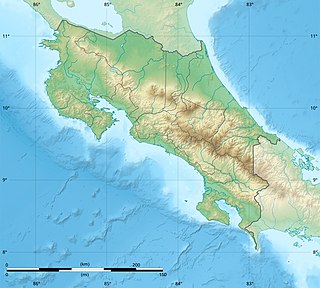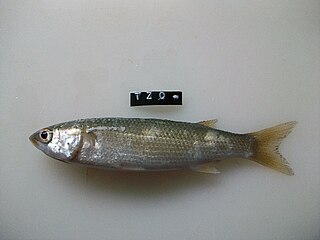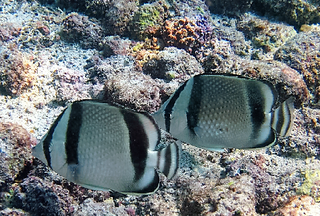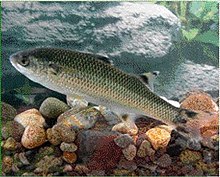
Maquenque Wildlife Refuge, is a protected area in Costa Rica, managed under the Arenal Huetar Norte Conservation Area, it was created in 2005 by decree 32405-MINAE.

The Reventazón River, Rio Reventazón,, is a river in Costa Rica.

The South African mullet, also called a harder mullet or simply harder, is a species of mullet. It is found in South African coastal waters from Walvis Bay (Namibia) to KwaZulu-Natal, and grows to a maximum length of 40.5 cm. The person the specific name honours was not recorded by Andrew Smith when he described this species but it is most likely to be John Richardson (1787-1865), the Scottish naturalist, surgeon and Arctic explorer.

Hypsophrys nicaraguensis, the moga, is a species of cichlid native to the Atlantic slope of Central America, from Nicaragua to Costa Rica. The species is a popular aquarium fish and is traded under a variety of common names that include nickie, parrot cichlid, macaw cichlid, butterfly cichlid and nicaraguense. In Costa Rica it is known as a vieja.

The brownstriped grunt, also known as the burro, is a species of marine ray-finned fish, a grunt belonging to the family Haemulidae. It is native to the western Atlantic Ocean.

Haemulon vittatum, the boga, is an ocean-going species of grunt native to the western Atlantic Ocean. Bogas are also known as the snit in Jamaica, and bonnetmouth in the Bahamas. It was first described by Cuban zoologist Felipe Poey. This species used to be classified as Inermia vittata, but genetic data revealed that it belongs to the genus Haemulon.

Upeneichthys vlamingii, the blue-spotted goatfish, southern goatfish, black-striped goatfish, blue-striped red mullet, southern red mullet or western red mullet, is a species of marine ray-finned fish, a goatfish from the family Mullidae native to the coast of southern Australia.

Tortuguero National Park is a national park in the Limón Province of Costa Rica. It is situated within the Tortuguero Conservation Area of the northeastern part of the country. Despite its remote location, reachable only by airplane or boat, it is the third-most visited park in Costa Rica. The park has a large variety of biological diversity due to the existence within the reserve of eleven different habitats, including rainforest, mangrove forests, swamps, beaches, and lagoons. Located in a tropical climate, it is very humid, and receives up to 250 inches (6,400 mm) of rain a year.

The arrow goby is a species of goby native to marine and brackish waters of the Pacific coast of North America from British Columbia to Baja California. This species grows to a length of 6.4 centimetres (2.5 in) SL, though most do not exceed 4.2 centimetres (1.7 in) TL. This fish can also be found displayed in public aquaria. This species is the only known member of its genus.

The mountain mullet is a freshwater fish of the family Mugilidae in the Mugiliformes order. It can be found in North and South America, from North Carolina, Florida, Louisiana and Texas in the United States to Colombia and Venezuela, including the West Indies in the Antilles. It is the only species in the monospecific genus Dajaus.

Periophthalmodon septemradiatus is a species of mudskipper found along tropical shorelines of the eastern Indian Ocean where it occurs in marine, brackish and fresh waters from India to Indonesia. It is found along in estuaries as well as in the rivers.
Agonostomus catalai, the Comoro mullet, is a species of ray-finned fish, a mullet from the family Mugilidae. It is found in the Comoros and Madagascar where it is found in boulder strewn clear, fast flowing rivers, it may also occur in estuaries, It is eaten in Madagascar. The specific name honours René Catala (1901-1988) who was a coffee planter and biologist who collected type in Madagascar. It lays non adhesive, floating eggs.
The Diassanga mullet is a species of ray-finned fish, grey mullet from the family Mugilidae. It is found in the eastern Atlantic around the coasts of West Africa.

The grooved mullet is a species of ray-finned fish, a grey mullet from the family Mugilidae. It is found in the coastal waters of the eastern Atlantic Ocean off the western coast of Africa, as far north as Mauritania, and into the western Indian Ocean.
The pinkeye mullet, also known simply as pinkeye, or freshwater mullet, Richmond mullet, or river mullet, is a species of ray-finned fish from the grey mullet family Mugilidae and the only species in the genus Trachystoma. It is endemic to northeastern Australia where it occurs from the Burnett River in Queensland to the Clyde River in New South Wales. It is a subtropical species which is found in deep, slow flowing sections of rivers as well as in estuaries although it moves into coastal seas to spawn. It feeds mainly on algae and plant material, as well as detritus and benthic invertebrates.

Alfaro cultratus, the knife livebearer, is a species of tropical freshwater fish from the family Poeciliidae. It hails from Central America and is often kept in home aquaria.
Pomadasys macracanthus, the longspined grunt or Mexican gray perch, is a species of marine ray-finned fish, a grunt belonging to the family Haemulidae. It is native to the Eastern Pacific from Mexico to Ecuador.

Chaetodon humeralis, the threebanded butterflyfish, is a species of marine ray-finned fish, a butterflyfish belonging to the family Chaetodontidae. It is found in the eastern Pacific Ocean.

The Clipperton angelfish is a species of marine ray-finned fish, a marine angelfish belonging to the family Pomacanthidae. It is endemic to Clipperton Island, a French possession in the eastern Pacific Ocean.

Conodon nobilis, the barred grunt, is a species of marine ray-finned fish, a grunt belonging to the family Haemulidae. It is found in the Western Atlantic Ocean where it is a target species for some commercial fisheries.

















